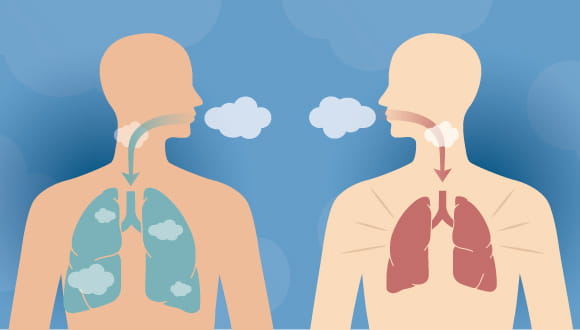What Does Shortness of Breath Feel Like & When Is It Serious?
July 7, 2021 - Katie McCallumBreathing is an automatic process, meaning it's carried out without any conscious effort on your part.
So, when breathing becomes a conscious effort — such that you're short of breath and have to remind yourself to take deep breaths — it can be frightening, especially if you've never experienced it before.
"Shortness of breath is a symptom that can be associated with many conditions, primarily heart and lung conditions. Both of these are incredibly important organs, so it's never a good idea to ignore shortness of breath or treat it lightly," says Dr. Zeenat Safdar, pulmonologist at Houston Methodist Lung Center.
The many causes of shortness of breath include:
- Asthma
- Chronic obstructive pulmonary disease (COPD)
- Pulmonary hypertension
- Pulmonary fibrosis
- Respiratory tract infection, including pneumonia or bronchitis
- Heart conditions, such as cardiomyopathy, heart attack and heart failure
- Obesity
- Being out of shape (muscle deconditioning)
- Anxiety or panic attacks
Where do you feel shortness of breath?
Shortness of breath is felt in your chest and can manifest as:
- Difficulty catching your breath
- Feeling a need to breathe more quickly or deeply
- Not feeling able to take a full, deep breath
- Feeling huffy and puffy
"You may first notice shortness of breath during physical activity. For instance, maybe you can no longer keep pace with someone you're walking with or you can't climb a flight of stairs. Previously, you could stop and take a deep breath and carry on, but that's harder now," says Dr. Safdar. "And shortness of breath can progress over time, to the point where you experience it even while at rest."
But not all shortness of breath develops slowly over time. Sometimes, shortness of breath hits suddenly, and maybe even severely.
When shortness of breath is acute, it's typically accompanied by other symptoms, such as:
- Fever and cough (pneumonia)
- Itching, swelling or a rash (allergic reaction)
- Wheezing (asthma)
- Pain in the chest, blurry vision and lightheadedness (heart attack)
- Chest pain and leg swelling, especially after long travel (pulmonary embolism)
When is shortness of breath serious?
"You should always take shortness of breath seriously," stresses Dr. Safdar.
Importantly, if shortness of breath is moderate to severe and occurs suddenly — and especially if it's accompanied by chest pain, lightheadedness and changes to the color of your skin — it's become a medical emergency that warrants a call to 911.
"This can be a sign of a heart attack or pulmonary embolism, which are both life-threatening emergencies," says Dr. Safdar. "Additionally, the symptoms of a panic attack can overlap with these medical emergencies. Still, even if you think your symptoms are due to a panic attack, it's important to go to the ER to get checked out and confirm you're not in immediate danger."
Then there's the milder shortness of breath experienced on occasion with physical activity. While this isn't a medical emergency, it's not something to ignore either.
"Even mild shortness of breath can be a harbinger of a more serious condition," says Dr. Safdar. "And if it progresses to the point where it's causing you to modify your activity level, it's definitely time to talk to your primary care doctor about your symptoms."
What does shortness of breath mean?
Shortness of breath occurs when you're not getting enough oxygen, leaving you to feel like you need to breathe harder, quicker and/or deeper. And, if you feel like you're not getting enough oxygen, your organs aren't either — which can have serious short-term and long-term consequences to your health.
"As mentioned, shortness of breath can be caused by a variety of conditions, ranging from asthma and COPD to heart failure. Your doctor can run the tests needed to help make a diagnosis, as well as offer lifestyle recommendations or prescribe medications that can help treat the underlying cause of your shortness of breath," explains Dr. Safdar.
For instance, if you are diagnosed with asthma, your doctor may prescribe an inhaler and recommend you quit smoking (if you smoke) and avoid other lung irritants.
"One thing to note is that smoking includes anything that results in smoke leaving your mouth — vaping and hookah included," adds Dr. Safdar.
If shortness of breath continues to progress despite lifestyle modifications and treatment, your doctor may refer you to a pulmonologist or cardiologist, depending on the source of your shortness of breath.
"Some of the more serious or advanced causes of shortness of breath, such as COPD or heart failure, are best treated by a specialist. A pulmonologist or cardiologist can run the more in-depth tests needed to fully understand your condition and identify the most effective way(s) to manage it," explains Dr. Safdar. "The goal is always to protect your health, but it's also about getting you back to a place where you can be active and enjoy the things you love again."








